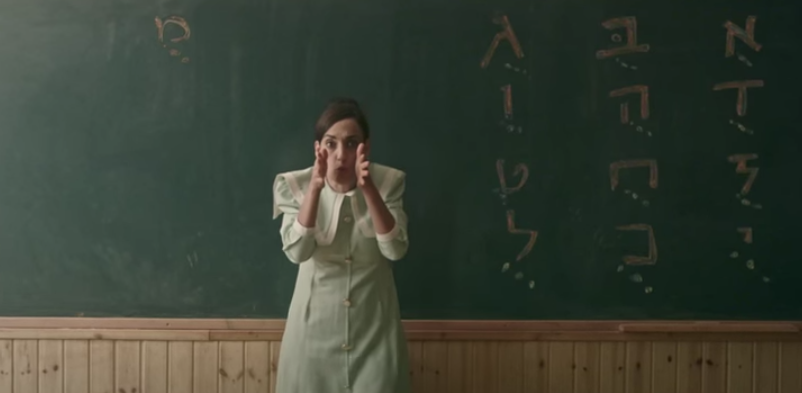
Victoria Hanna’s new twist on the Hebrew alphabet is a YouTube hit.
The sing-song chant of the Alef Bet, the Hebrew alphabet, is familiar to just about anyone who has ever sat in a Hebrew school classroom. With the help of a viral YouTube video, Israeli vocalist Victoria Hanna has now made that familiar chant feel both strange and inspiring.
Hanna grew up in an ultra-Orthodox family in Jerusalem, the daughter of an Egyptian father and Persian mother. In this lecture she recalls growing up as the daughter of a rabbi whose house was full of books, and describes her resulting awareness that Hebrew letters were more than just shapes on a page. She says, “When you look at the letters . . . you drink the letters in your eyes. In the Jewish tradition, the letters are not separated from meaning, and the meaning is not separated from the physical existence and from the sound.” This conception of the Hebrew alphabet, which is ultimately kabbalistic in origin, has been explored by Jewish thinkers from Gershom Scholem to the poet Haim Nahman Bialik.
Hanna’s Alef Bet video takes the mystical idea of an embodied alphabet to a new level. Dressed in a starched teacher’s uniform, she stands at the front of a girls-only classroom and start to demonstrate how the letters sound when combined when different vowels. It quickly becomes clear that this is not your typical language lesson. A hip-hop beat supplied by Balkan Beat Box member Tamir Muskat moves the song into an aggressively percussive rhythm. With her chorus of uniformed schoolgirls supporting her, Hanna weaves in parts of the Sukkot prayer service, showing how Hebrew letters combine to create the poetic sounds of prayer. My ear also caught interpolations of Mizrahi melodies, a nod to her parents’ roots.
For me, though, the visuals of the video–and their subversive feminist symbolism–were what stayed in my head long after the last beat had faded. Hanna plays fearlessly with the gender boundaries of Orthodox Jewish schooling, particularly the history of the heder, the traditional Jewish classrooms in Eastern Europe where only boys were allowed to study. She references a common initiation rite dating at least as far back as medieval times: when a young boy began his studies or received his first humash (volume of the five books of Torah), his rabbi would bring him a slate or page of letters dripping with honey; the boy licked the honey off the letters in the hopes of beginning of sweet life of Torah study. The biblical text often connected with this highly symbolic ritual was Isaiah 50:4, “The Lord God gave me a skilled tongue
Victoria Hanna is well aware of these traditions and gleefully turns them upside down in her music video. Instead of a room full of boys, she commands a room full of girls; at times she even creates multiple versions of herself, wearing braids and a schoolgirl uniform, to sit at every desk. She connects the letters with her female body, and then enacts the ritual of tasting honey for her female pupils. However, the honey is not just a few drops – it’s a thick, viscous pile that at one point in the video flows backwards, reversing history and, perhaps, undoing the male-only tradition of Torah study. At other points in the video she handles clods of earth and glowing flames. Hanna’s feminist vision of the Hebrew alphabet is elemental and copious, overflowing all boundaries. It’s seductive, energetic, disruptive, and a little bit dangerous.
Jewish mystical tradition has a lot to say about the power of the Hebrew alphabet. Thanks to her provocative interpretation of what it means “to know how to speak,” now people have a lot to say about Victoria Hanna.
Watch the video here:







WONDERFUL!!!!